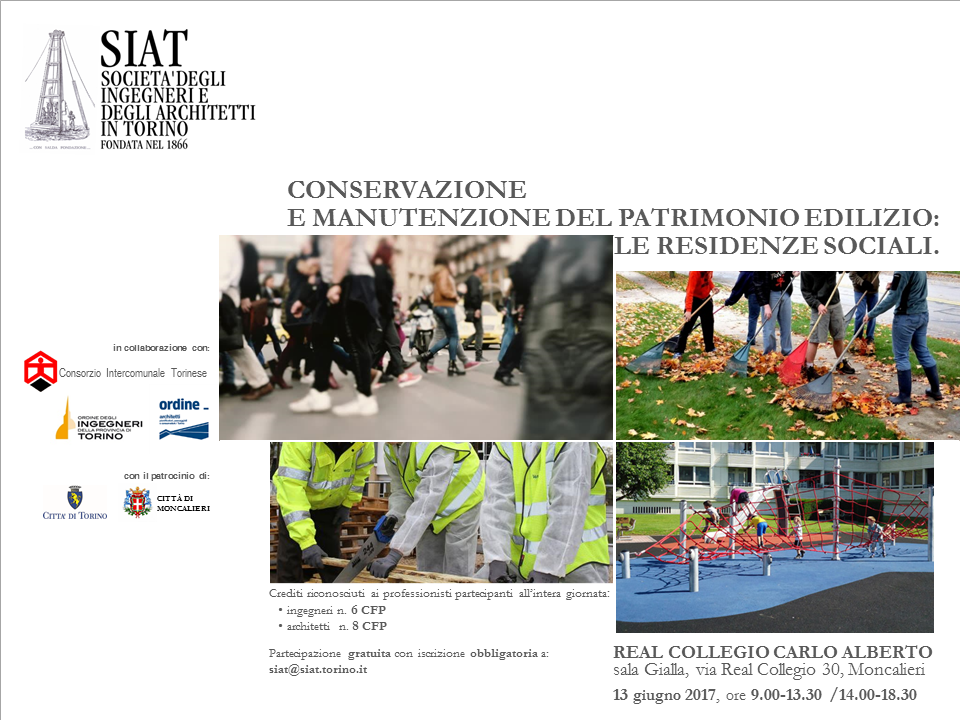Conservazione e manutenzione del patrimonio edilizio: le residenze sociali
La Società degli Ingegneri e degli Architetti in Torino ha promosso un convegno sui temi della gestione e conservazione del patrimonio edilizio in particolare dell’edilizia sociale. Il patrimonio di edilizia sociale pubblica rappresenta uno spaccato importante della storia dell’architettura e edilizia, oltre che, per le finalità che lo contraddistinguono, un coacervo di tensioni ideologiche e sociali. Da sempre la questione della casa è colorata dalla necessità di dare risposte a urgenze abitative e dalla difficoltà di una gestione economicamente impegnativa quanto improrogabile in un ambito di servizio sociale. La gestione del patrimonio edilizio investe capacità tecniche e organizzative, richiede soluzioni tecnologiche anche innovative per interventi straordinari oltre che una cadenzata manutenzione ordinaria, coinvolge un’ampia rosa di saperi, scienze sociali e ingegneristiche, culture della progettazione architettonica, urbana e edilizia, ambiti professionali e di mestiere, ambiti imprenditoriali e finanziari, presuppone la disponibilità di informazioni d’archivio e il loro costante aggiornamento. Diverse le ricadute dirette e indirette. Sul patrimonio edilizio pubblico possono essere avviate attività di riqualificazione energetica con contributi importanti per le politiche di sostenibilità ambientale del territorio. L’intervento manutentivo edilizio e impiantistico ha valenze occupazionali diffuse. La qualità del patrimonio edilizio è lo specchio della qualità di vita di un territorio; una qualità diffusa e decentrata è il termometro dello stato di benessere di una collettività. Il tema del patrimonio edilizio pubblico mantiene al centro l’aspetto del soddisfacimento delle esigenze dell’utenza che non può essere solo statisticamente rappresentata, fatta di segmenti sociali diversi, di età diverse, di abitudini diverse. L’edilizia sociale è spesso lo scenario in cui si compongono o si rompono equilibri di integrazione, con tutti i suoi risvolti sociali; è il luogo in cui si costruisce o si allontana l’appartenenza civica, in cui si può organizzare un processo di partecipazione e ribaltare le logiche monopolari del sistema urbano. Inoltre, la questione della manutenzione riguarda in egual misura l’edilizia privata, là dove la sostituzione dei fabbricati appare ancora poco praticabile, l’assenza di manutenzione porta all’obsolescenza e al deprezzamento del valore immobiliare.
Uno sguardo allargato
A Far-Sighted Approach
Beatrice Coda Negozio
The conference, planned in two sessions, territorial policies and buildings and infrastructures, pointed out the emergency in matter of social housing solutions – for both old and new user needs – being suitable for person, environmentally friendly and sustainable through the years. The engineering design process, as a whole, requires the cooperation among skills since the very beginning, future users included.
Itinerari di architettura e edilizia popolare a Torino
Social Housing Architectural Walks in Turin
Mauro Sudano
An architectural walk through Turin social housing pointing out both, historically valuable interventions and remarkable contemporary housing examples. We look over Turin architecture and town-planning path that had root in the Thirties. For a better understanding of the topic, the article compares architect works, technical manuals and legislation of the period.
La residenza sociale a Torino: storia, conservazione e tutela
Social Housing in Turin: Conservation and Preservation
Luisa Papotti
This historical excursus shows that social housing in Turin has its roots in the 16th century with the involvement of public institutions, religious charitable bodies and private entities, which progressively matured into the settlement criteria and realisations of the early 20th-century. Preservation issues with regards to adaptation and efficiency, which require a precise knowledge of the buildings and the mediation of the project, combining a restorer’s skill with an engineer’s know-how.
La casa per tutti: una prospettiva ancora all’ordine del giorno?
Homes for All: a Perspective Still Under Discussion?
Guido Montanari
After a brief digression into the history of social housing between the nineteenth and twentieth centuries, this paper aims to focus new attention on the heritage of public social housing as an opportunity for architectural requalification and professional updating, capable of tackling the urgent housing problem and restoring dignity and social responsibility to the work of engineers and architects.
Interventi artistici come esercizi di partecipazione sociale
Artistic Practice as Exercises of Social Participation
Cristina Giudice
This paper is about the relationship between public space and contemporary art, with a focus on some recent works, which bring to light in a new way the problem. In the last few decades we have witnessed a proliferation of artistic presence in cities, which have been often criticized and not well appreciated by the local community, because they felt used and supplanted. In these years, Turin has evidenced the possibility of a different way of inserting artistic works, with projects in which the local people have participated and helped to construct with the idea of caring and giving a greater value to the whole project. In conclusion, I shall present two examples of artistic works, which go beyond the idea of relational art: they are real projects of social participation at a wide range, able to provoke the role of the observer.
Energy Manager al Politecnico di Torino
Energy Manager at the Politecnico di Torino
Gian Vincenzo Fracastoro
The work of the Energ y Manager is outlined, highlighting the particular characteristics that it entails in a body such as the Polytechnic of Turin that is involved with training, research and innovation in the technical sector. Together with user-learning activities, the slow but determined path of the Polytechnic towards energ y efficiency, plant modernisation and the development of sustainable sources is also described. As is the recent creation of the Green Team, which embodies the Polytechnic’s desired policy of making its campus a living laboratory of sustainability in the widest meaning of the term, in which the subject of energy is flanked by those of mobility, waste management, green acquisitions, water, food and so on.
Diagnosi integrata e interventi di manutenzione. Esperienza pilota a Venaria Reale per il Piano di censimento e manutenzione degli edifici pubblici
Integrated Diagnosis and Maintenance Interventions. Pilot experience at Venaria Reale for the Census and Maintenance Plan of Public Buildings
Raffaele Fiorelli, Mauro Sudano
The day-to-day management of the social housing patrimony would require a systematic knowledge of the conditions of the building and plant systems and maintenance programming. In many cases the current situation is characterised by obsolescence and elevated energy consumption. The article illustrates the pilot experience carried out on public
buildings for the City of Venaria which adopted a multidisciplinary approach by way of an integrated diagnosis to draft a maintenance plan.
Tecnologie sostenibili per la riqualificazione. I geopolimeri: dalle antiche malte fenicioromane
uno straordinario esempio
Sustainable Technology for Renovation. Geopolymers: an Extraordinary Example from Ancient Phoenician-Roman Mortars
Gilberto Quarneti
This paper presents research on traditional binders, and in particular geoploymers, based on the study of ancient sources and on the observation of the chemical structure of materials and compounds used in the earliest periods on buildings that are still today fairly well preserved: slaked lime, cocciopesto or mortar mixed with earthenware fragments, pumice, zeolites, pozzolanas, silica sand. Scientific observation allows ancient technology and know-how to be reproduced and appropriately reused in the restoration and upkeep of historic patrimony, via an approach respectful of natural resources.
Economia dell’edilizia sociale
Social Housing Economics
Luca Consiglio
In recent years social housing represents a strategic asset class for investors. A specific economy of social housing has arisen, within which we find the investment models adopted by institutional investors and more specifically by real-estate investment funds, held to be one of the main tools for promoting social housing interventions.
Progetti di Social Housing per la riqualificazione diffusa
Social Housing Projects for a Widespread Re-Qualification
Luisa Ingaramo, Stefania Sabatino
The Programma Housing (PH) of Compagnia di San Paolo Foundation (CSP) operates in the social housing sector to support innovative solutions to contrast economic and social vulnerability through three main action lines, which differ depending on the funding strategy and the operating model: “Contributions to external projects”, “Experimentations” and “Real estate ethical funds”. Within this framework, the PH works closely with public, private, non-profit territorial partners by means of round working tables, dialogical discussions, research and development, monitoring and communication. PH, in short, aims at creating stability within the social and territorial environment, aware that social housing quality cannot be only satisfied by the building upgrading and the housing cost sustainability: architectural, urban, environmental, social and economic-financial aspects simultaneously contribute, in fact, to the territory widespread re-qualification.
Patrimonio immobiliare di Reale Immobili: strategie di manutenzione
Reale Immobili’s Real Estate Patrimony: Maintenance Strategies
Livia Piperno
The article illustrates the management values and policies adopted by Reale Immobili (Reale Mutua group) to satisfy the needs of the rental market through the conservation, maintenance and transformation of a very large private patrimony, which necessarily interacts with spaces of great public interest.
Sharing Torino, in via Ivrea un intervento innovativo per l’housing sociale temporaneo
Sharing Torino, an Innovative Intervention of Temporary Social Housing in Via Ivrea
Paolo Sobrino
This illustrates the story behind one of the pilot experiments in social housing in Turin with a public-private agreement, which allowed for the reconversion and rehabilitation of an abandoned building, resulting in an acclaimed example of successful urban regeneration. The social component lies in the application of moderate rents, triggering initiatives for social integration and assigning temporary accommodation; the housing component, open to young people and to people passing through, includes both guest quarters, residence, campus and flats, as well as residential units for families and people waiting for public housing.

Quest'opera è distribuita con Licenza Creative Commons Attribuzione - Non commerciale - Condividi allo stesso modo 3.0 Italia.






